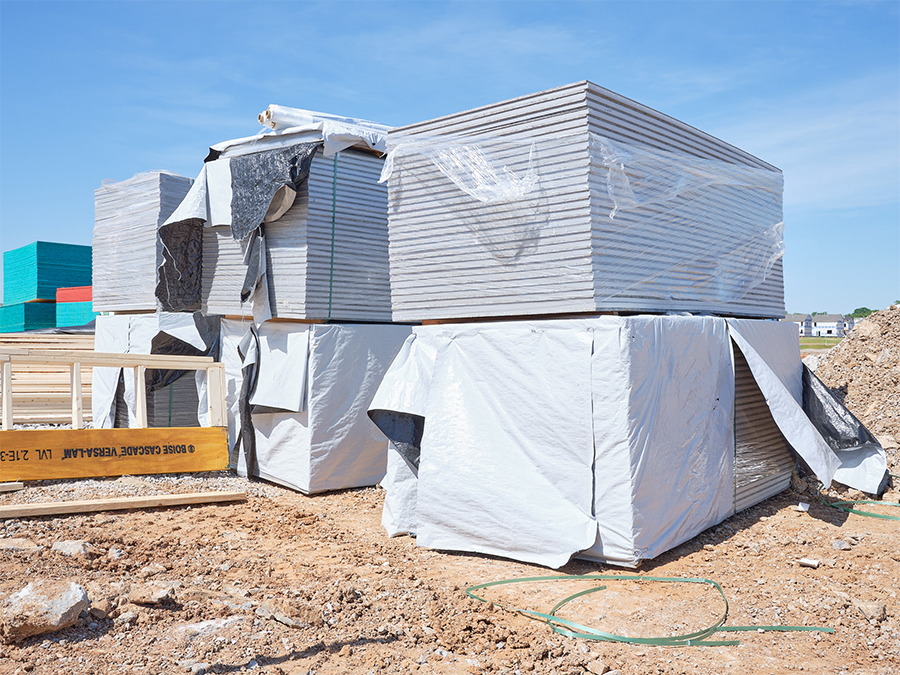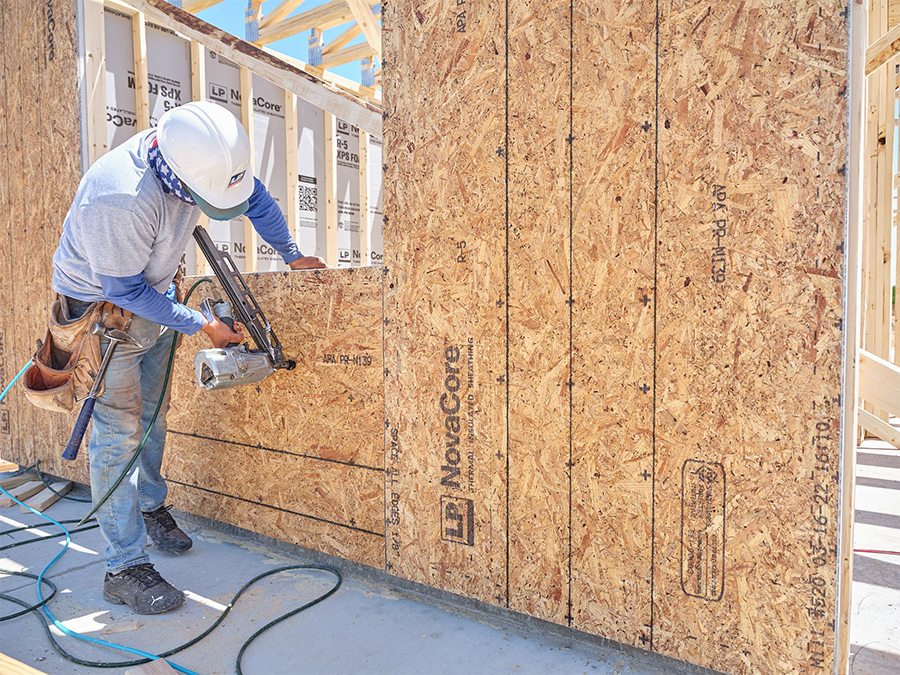Business Advice6 min
How to Install Insulation Sheathing with LP® NovaCore® Thermal Insulated Sheathing
New to the LP® Structural Solutions portfolio, LP® NovaCore® Thermal Insulated Sheathing is a dual-layered wall panel design to protect structures against heat loss and gain. It combines resilient OSB sheathing with XPS foam to provide continuous insulation without the long-term R-value deterioration associated with other foam insulation products.
While LP NovaCore panels install similarly to regular OSB sheathing, there are a few key best practices to know for insulation sheathing installation before you get started. When the installation instructions are followed, you can help ensure the product performs as it's intended. We checked in with Chris Dall, Growth & Innovation Product Manager at LP Building Solutions, for some tips and tricks.
Storage and Handling of Insulated Sheathing Panels
As soon as your LP NovaCore thermal insulated sheathing panels arrive on the jobsite, proper storage and handling is critical to ensure your panels can perform once installed. As you inspect the product prior to installation, here are a few guidelines to remember:
Store panels off the ground, well-supported on a flat surface. Store indoors or protected from extended UV exposure of the foam or water exposure.
Use a minimum of three stickers spaced evenly under each unit. Ensure stickers are aligned vertically when stacking.
Do not stack higher than three units.
Use the weather-resistant cover that comes with each unit when it is packaged. Replace the cover over the unused panels as you work.
Do not drop the panels on corners or crush the edges of the foam insulation.
Do not allow foam insulation to contact flame or heat sources over 165° F.

"If the original cover is not used, use only opaque white covers to avoid damage to the foam," Dall adds. "Do not use non-white or non-opaque covers as these can build up excess heat or expose the foam to UV." Dall also notes that if a panel's foam is damaged, it can still be used as a fill-in panel by cutting off the affected area and trimming to the needed size.
Insulated Sheathing Panel Installation Requirements
Beyond installing the panels correctly, don't forget these standard requirements for a build using LP NovaCore thermal insulated sheathing. Be sure to check your local codes as well.
LP NovaCore panels must only be used for walls and are limited to Seismic Design Categories A, B and C.
An approved thermal barrier must be installed on the interior side of the wall framing, opposite the LP NovaCore panels.
Panels must be covered by an approved water-resistive barrier (WRB).
LP NovaCore thermal insulated sheathing panels can be cut with standard woodworking tools, helping you work efficiently and easily as you would with other wood products. "While cutting the board with a circular-saw or worm-saw, we recommend you cut on the OSB side to prevent any snagging of the baseplate while cutting," Dall says.
Check out more guidelines and requirements in the complete installation instructions.
LP NovaCore Thermal Insulated Sheathing Basic Installation Tips
When you're ready to begin installation, many typical wall sheathing best practices apply. "In order to install LP NovaCore thermal insulated sheathing panels properly, the foam must face the framing members (studs) and the OSB side should face outwards," Dall specifies. Panels can be installed horizontally or vertically. For horizontal installations, stagger joints a minimum of one stud space.

Here are a few other basic tips for insulation sheathing installation:
All panel edges must be backing by framing or 2x blocking.
Provide 1/8-inch minimum space between panel ends and edges.
Use 3-inch long and 0.131-inch diameter full round head framing nails.
Space nails no more than 4 inches on center along supported panel ends and edges and 12 inches on center at intermediate supports.
Place nails 3/8-inch from all panel edges.
Read more about nailing practices here.
Installing Thermal Insulated Sheathing at Corners
When you’re installing LP NovaCore panels at corners, take special care with the following instructions:
Outside corners: Install the first panel to within 1/8-inch of the edge of the corner end stud. Install second panel to overlap so that its edge is flush with the outer face of the OSB from the first panel.
Inside corners: Install the first panel into the flat stud of the connecting wall, leaving a 1/8-inch gap. Install the second panel from the other side, leaving a 1/8-inch gap.
Check out details and diagrams here.
Because LP NovaCore panels are 7/16-inch thick, additional framing may be needed at corners to account for the thickness of the panels.
Making Insulation Sheathing Installation Easier Than Ever
Because LP NovaCore panels are made with engineered wood, they represent an easy and efficient way to add protection against heat loss and gain to your build. They install simply and easily with standard tools and procedures, integrating seamlessly into your processes.
“With the foam layer facing inward, towards the framing members, LP NovaCore sheathing is an easy-to-install product that combines OSB with Owens Corning FOAMULAR NGX to provide racking strength and continuous insulation in a one-step installation,” Dall says.
Looking for more details? Learn more about the latest addition to the LP Structural Solutions portfolio. And be sure to read up on the complete installation procedures for LP NovaCore panels.
Continue Reading
Resiliency Solutions
5 minIntroducing LP® SmartSide® ExpertFinish® Naturals Collection™: Nature-Inspired Beauty Meets Engineered Performance
We’re excited to introduce the LP® SmartSide® ExpertFinish® Naturals Collection™, a bold new addition to our trusted line of engineered wood siding and trim that delivers the warmth and beauty of nature with the advanced protection and performance builders and homeowners expect.
Labor Solutions
5 minChoosing the Right LP® Structural Solutions Product for Your Build
When it comes to building strong, reliable, and high-performing structures, the materials you choose matter. At LP Building Solutions, we understand that every project, whether it's a single-family home or a multifamily development, requires structural components that meet your needs for strength, durability, and efficiency.
Sustainability Solutions
5 minBuilding a More Sustainable Future with LP Building Solutions
In today's world, sustainability is no longer just a buzzword, it's a blueprint for responsible living and smarter building. As the construction industry seeks ways to reduce its environmental footprint, LP Building Solutions is focused on providing innovative building materials for eco-conscious builders to help reshape what it means to build sustainably
News & Stories3 min
History of Partnership with Gary Sinise Foundation
The LP Foundation is a proud partner of the Gary Sinise Foundation, which supports wounded veterans in several ways. You can learn more about the LP Foundation here.